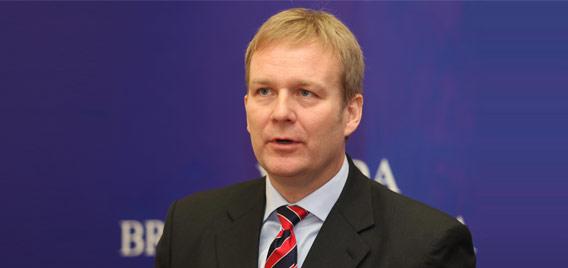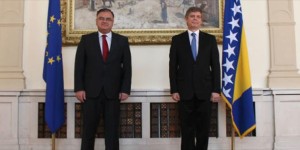Ambassador Sorensen’s interview to the daily “Politika” published on 25 March 2013
Sorensen: BiH’s path to the EU could be frozen
In an interview for Politika newspaper, the Ambassador Sorensen underlines that BiH must not fall behind its neighbours on the road to the EU.
The EU Special Representative and Head of the EU Delegation in BiH, Peter Sorensen, says that the country’s politicians, if they keep their promise and agree on the execution of the ruling of the EU Court of Human Rights in Sejdić-Finci, will prove they are willing to take the country forward. Otherwise, his message goes, BiH’s path to the EU could be frozen.
In his interview for Politika, Sorensen notes that the position of the EU and its member states are very clear and underlines there will be “no special arrangements” for BiH on its way to join the EU, and says BiH has to follow the same process as every other country.
Although he leaves it to politicians to answer the question whether they will observe the deadline they gave to themselves, the Head of the EU Delegation reiterates the time is running out and that BiH is lagging behind its neighbours.
“Other countries in the region are making progress – Serbia has candidate status, Croatia will soon join, Montenegro is in front of accession negotiations. We could not have been more explicit about the things that need to be done to move BiH’s EU integration forward”, says Sorensen.
The Danish diplomat, a lawyer by profession, does not specify what could be an EU’s concrete response in case BiH leaders yet again fail to meet the deadline but suggests the EU has put in place a broad and balanced set of instruments within the mandate of the Special Representative and the Delegation of the EU.
“But, the most important factor is the response of the local political forces – no agreement would mean stagnation in EU integration. The EU member states, and the EU institutions have been very clear in this regard. There will be no ‘special arrangement’ for BiH on its way to join the EU. It has to follow the same process as everyone else. So if there is no progress there is a consequence – BiH will get left behind by neighbouring countries”, he emphasises and claims that “No specific proposal is being ‘pushed’ forced by official Brussels” as to changes to the BiH Constitution, particularly not the election of the members of the BiH Presidency according to the US model of electors?
He reminds that the issue “has been on the table for too long” and the BiH Constitution must be aligned with the European Convention on Human Rights.
„In terms of internal co-ordination, there is a need to improve the efficiency and functioning of institutions with regard to EU integration. The country needs to be in a position to adopt, implement and enforce the laws and rules of the EU smoothly and this is why we are urging the different levels of authority to agree a co-ordination mechanism. Also this is needed for the country to benefit from the next ‘phase’ of major EU funding. In 2007 – 2013 BiH has been able to draw on 660 million euro from IPA – in order to benefit from IPA 2, BiH must have the means for efficient implementation“, he explains.
Asked whether he believes that BiH will become an EU member state, he says that many in the EU have been disappointed by the lack of leadership amongst the most prominent politicians to make progress on the EU path.
„We want Bosnia and Herzegovina to join the EU and stand by the overwhelming majority of the people of BiH who want their country to join the EU. it is up to BiH to decide when it will submit an EU membership application. When it does, it should be credible and that means undertaking the reforms to ensure a functional state working in full respect of EU values“, points out Sorensen, who also believes that the solution for the deep political crisis the Federation of BiH has been stuck in must come exclusively from the Federation’s leaders. „I have made it clear on a number of occasions that the solutions must come from the Federations’ leaders and that the Federation of Bosnia and Herzegovina needs a fully functional government as soon as possible. The relevant political actors in the Federation bear the responsibility in this regard, and their common goal must be to ensure that the Federation authorities are established in line with democratic and constitutional principles“.
Commenting on the fact that the executive authority of the Federation has been established with the help of the High Representative, as well as whether it is time the OHR got involved again, the EU Special Representative says, „It’s not for me to pre-judge a separate institution“.




